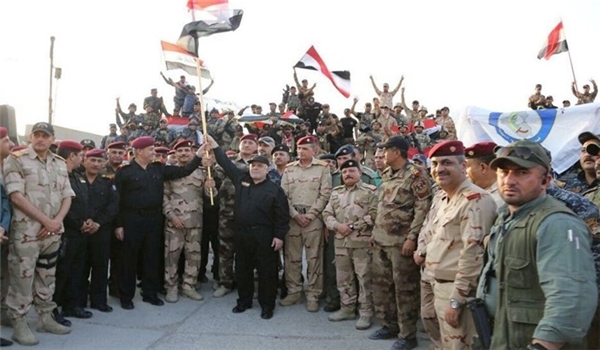
RNA - Regardless of the declaration of victory in Mosul, the foreign-backed terrorists are likely to continue staging attacks there and other Iraqi cities for months, if not years. For now, one challenge is the future of Mosul itself, a city traumatized by ISIL’s brutal rule and shattered by US airstrikes, with thousands dead and nearly one million people displaced.
Despite some Western media claims, the Iraqi government, army, volunteer forces and their Iranian allies have prepared a post-battle plan for governance and security and are more than ever prepared and willing to help Mosul leaders rebuild the city.
More so, military operations are far from over. Worse still, Masoud Barzani, president of Iraq's autonomous Kurdish region, has weaponized the situation by announcing a Sept. 25 referendum for an independent state. To many dislodged civilians who survived the battles, this makes the victory a bitter one. They have lost their homes, belongings and family members, and instead of getting help from their Kurdish fellow citizens, they are hearing US-backed sedition and partition tunes.
That said, the liberation of Mosul does in no way expose ethnic and sectarian fractures that plagued Iraq for more than a decade. Any doubters should ask Ramadi and Tikrit. The victories there didn’t trigger any violence between Arabs and Kurds over disputed territories or between Sunnis and Shiites over claims to power, egged on by outside powers that have shaped Iraq’s future since the 2003 US-led invasion and occupation. There is no reason to think Mosul will be any different.
And no, Iraq is no longer stunned by the blitz of ISIL or the collapse of its armed forces. People are celebrating the liberation of Mosul because they would never allow victory turn out to be a problem, let alone allowing post-ISIL Iraq collapse into ethno-sectarian carnage. As with Tikrit and Ramadi, Mosul belongs to the people of Iraq – Arabs and Kurds. They will never give up on government’s rule in Baghdad.
Into the argument, the idea that Shiite leadership will keep the liberated areas as loose areas, with no local political leadership, or security organizations, so as to control them, is well an illusion. There is no such thing as a winner-take-all logic of victory, and certainly no plan to make Mosul a self-governing region like Kurdistan, with smaller units of self-rule to accommodate the plethora of minorities, even if it is permitted by the constitution. Again, that’s just an illusion.
With Mosul fully liberated, the people of Iraq now have hope and faith in the new Iraq that they have helped liberate. The government stands with them on each and every constitutional provision and article to have a country with equal citizenship, with no discrimination, with partnership. Senior officials have left no doubt their priority to keep Iraq as a unitary state trumps everything else. They know that God caused all things to work together for good to those who are called according to His purpose. After all, liberation of Mosul was an act of God.
Therefore, those who claim recapturing Mosul is only the beginning, don’t like Iraq at all. Like it or not, people will soon begin returning to their homes and communities - with reconstruction by the Iraqi government and the international community. There are no barriers and certainly no fear of revenge for atrocities that have been committed. Nor will there be blacklists of people accused - rightly or wrongly - of complicity, or lack of coordination among local authorities and security forces.
To substantiate, two civic organizations - SANAD for Peacebuilding and the Network of Iraqi Facilitators - have been analyzing tribal, social and political dynamics in areas of Iraq recaptured from ISIL. The groups have facilitated dialogue among local leaders to reduce tensions and encourage reconciliation. SANAD for Peacebuilding (in Arabic, means “support”) and the facilitators’ network have led such reconciliation processes, including in 2015, when Iraqi forces retook Tikrit from ISIL. The two groups work with support from the government and the results have been amazing.
After Shiite forces recovered Tikrit, Sunnis displaced in the warfare avoided going home, fearing revenge attacks by the Shiites as claimed by some western and Saudi medias. SANAD and the Iraqi peace facilitators led a reconciliation dialogue among Sunni and Shiite tribal leaders that led to a process under which more than 300,000 displaced residents returned home.
Mosul is next. It could be the toughest venue of all for this peacebuilding work, but peace and security will still prevail – despite some longstanding disputes. The potential for sectarian violence also remains low, as evidenced by opinion polls that show Iraqi people only see ISIL, Al-Qaeda and their patrons as enemies. They remain focused on the country’s development and its current battle against ISIL. They see that their fundamental problems are political, which if not resolved through dialogue, ensures US occupying troops will remain after ISIL is defeated.
847/940